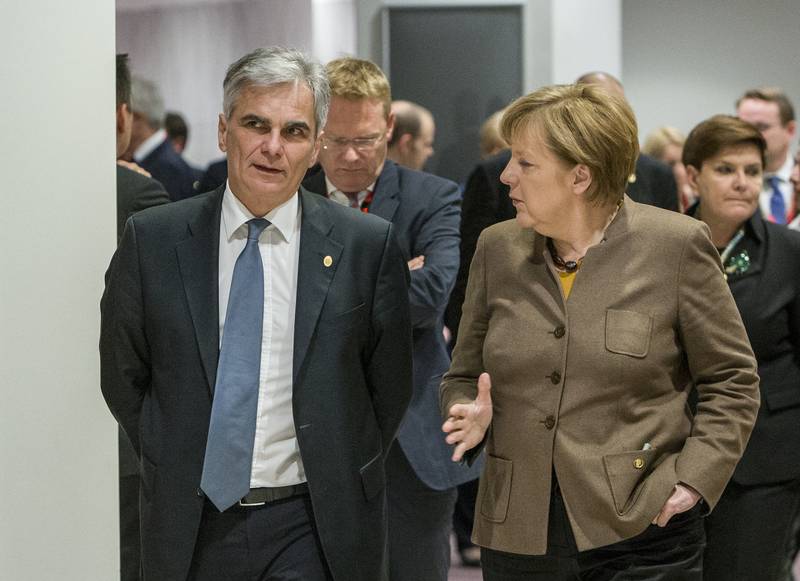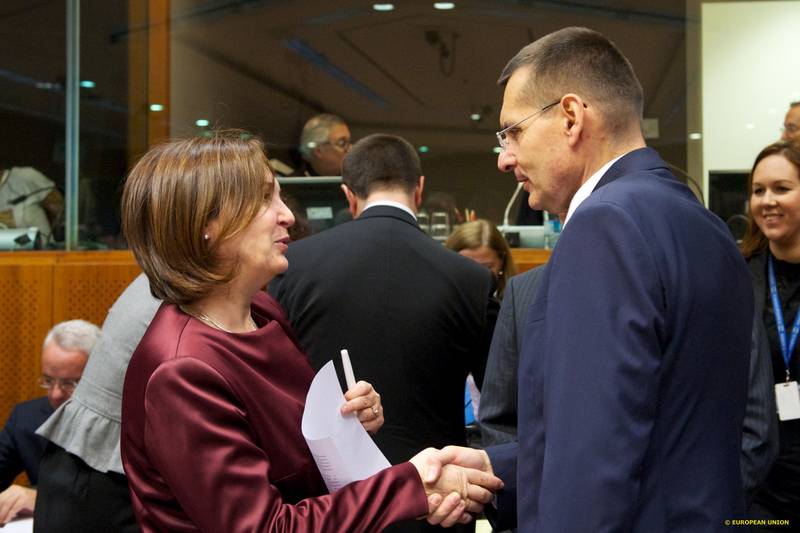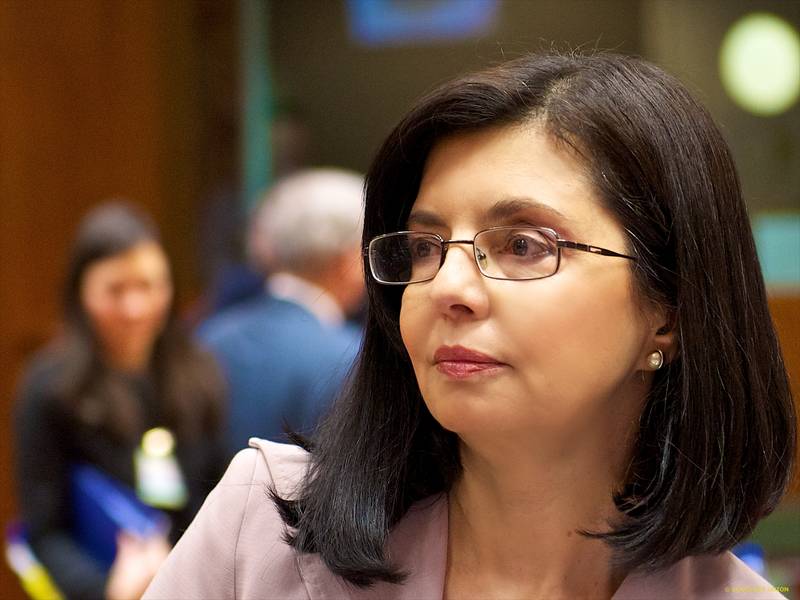Commissioner Malmstrom: I'm Disappointed with the Member States
Ralitsa Kovacheva, September 26, 2011
 The unsuccessful attempt of Bulgaria and Romania to receive at least partial Schengen membership has understandably overshadowed the other topics discussed at the Justice and Home Affairs Council on the 22nd of September. But the issue of the two countries' adoption cannot be viewed outside the context of another two key issues discussed by the ministers - the reform of the Schengen area governance and the Common European Asylum System (CEAS). Judging by the meeting's length and the subsequent comments of the Polish Interior Minister Jerzy Miller, who chaired the Council, and EU Commissioner Cecilia Malmstrom, the discussions hardly went smoothly.
The unsuccessful attempt of Bulgaria and Romania to receive at least partial Schengen membership has understandably overshadowed the other topics discussed at the Justice and Home Affairs Council on the 22nd of September. But the issue of the two countries' adoption cannot be viewed outside the context of another two key issues discussed by the ministers - the reform of the Schengen area governance and the Common European Asylum System (CEAS). Judging by the meeting's length and the subsequent comments of the Polish Interior Minister Jerzy Miller, who chaired the Council, and EU Commissioner Cecilia Malmstrom, the discussions hardly went smoothly.
As euinside wrote in details, on September 16 the European Commission presented its proposal for changes in Schengen's governance. In the words of Commissioner Malmstrom, the proposal achieves "strengthening the evaluation and the early warning, so that we can very early identify possible problem, and also keeping the grounds of, when possible, borders could be reintroduced but changing the decision-making procedures to allow for a fully communitarian approach to this. Because if you decide to reintroduce the internal border, of course this affects your neighbour and therefore all Member States need to be involved in this."
Jerzy Miller commented that the Commission's proposal had set the right priorities, but it must yet be subjected to careful analysis by the Member States.  "What was important in my mind was the agreement that these issues are vital, very important and all the Member States expect a swift thorough analysis of all the procedures and the monitoring of these procedures, how they are implemented, so it does not happen in the future that we have to hold discussions on the reinstating of internal borders. It would be a last resort in extreme circumstances, either due to extreme circumstances in a given Member State, or if a Member State fails to fulfil its obligations stemming from the European legislation in this respect."
"What was important in my mind was the agreement that these issues are vital, very important and all the Member States expect a swift thorough analysis of all the procedures and the monitoring of these procedures, how they are implemented, so it does not happen in the future that we have to hold discussions on the reinstating of internal borders. It would be a last resort in extreme circumstances, either due to extreme circumstances in a given Member State, or if a Member State fails to fulfil its obligations stemming from the European legislation in this respect."
Cecilia Malmstrom expressed herself diplomatically, defining the discussion held on the topic as "dynamic". Given the resistance of Member States to cede more powers to Brussels on issues related to security and the Franco-Italian initiative of this spring, national governments to have the right to return borders at their discretion, we can imagine what Ms Malmstrom had meant. But, as she recalled, however, the Commission's proposal was really fresh and it was just the first exchange of views on the matter. This is not the case, though, with the Common European Asylum System.
The debate on the legislative package on asylum has been running for years but is now stalled. This was not the first time we discussed the common asylum system and certainly not the last, Cecilia Malmstrom said. She thanked the Polish Presidency's efforts to break the deadlock in the negotiations, but was strongly critical of the  Member States: "I must say I am a little bit disappointed with Member States, because if we want to achieve something that we have all agreed to achieve, that Member States have agreed to achieve – a common European asylum system by 2012 - everybody must make compromises. And there was not really a spirit of compromises today."
Member States: "I must say I am a little bit disappointed with Member States, because if we want to achieve something that we have all agreed to achieve, that Member States have agreed to achieve – a common European asylum system by 2012 - everybody must make compromises. And there was not really a spirit of compromises today."
On behalf of the Presidency Jerzy Miller admitted that this was the most difficult topic in the agenda and supported Commissioner Malmstrom in terms of the need for compromises, because at the moment "10 Member States accept 90% of asylum seekers." In order to speed up the process and to meet the deadline for adopting the legislation in 2012 the Polish presidency has decided to implement a more efficient way of working with all institutions in the form of informal working groups. Jerzy Miller stressed that the Presidency maintained a constant dialogue with the Committee on Civil Liberties, Justice and Home Affairs (LIBE) in the European Parliament.
"The recent events in the Mediterranean and the need to restructure the asylum systems of some Member States confirm the necessity of creating a common procedure and a uniform status at EU level," the annual report of the Commission on Immigration and Asylum (2010) states. To that end, there is a need for better European legislation, improved cooperation with third countries and "a concrete multifaceted commitment to solidarity," the document stresses. The Commission clearly insists the European Parliament and the Council to agree on the EU Joint Resettlement Scheme.
According to the paper, in 2010 Member States recorded more than 250,000 asylum applications. While Poland, Italy, Hungary and Malta received less asylum-seekers in 2010 than in 2009, significant increases were recorded in Germany, Belgium and Sweden. The majority of asylum seekers in the EU were nationals of: Afghanistan (20,580), Russia (18,500), Serbia (17,715, excluding Kosovo), Iraq (15,800) and Somalia (14,350). On the occasion of Serbia and other Western Balkan countries, this piece of data has forced the European Union to threaten them that it would suspend the liberalised visa regime for their citizens. More than 55,000 asylum seekers received a protection status in the EU at first instance. By the third quarter of 2010 nearly 4,000 people were resettled in the EU from third countries (for 2009 their number was 7,147).
 Werner Faymann, Angela Merkel | © Council of the EU
Werner Faymann, Angela Merkel | © Council of the EU Rumyana Bachvarova, Petre Toba | © Council of the EU
Rumyana Bachvarova, Petre Toba | © Council of the EU Meglena Kuneva | © Council of the EU
Meglena Kuneva | © Council of the EU